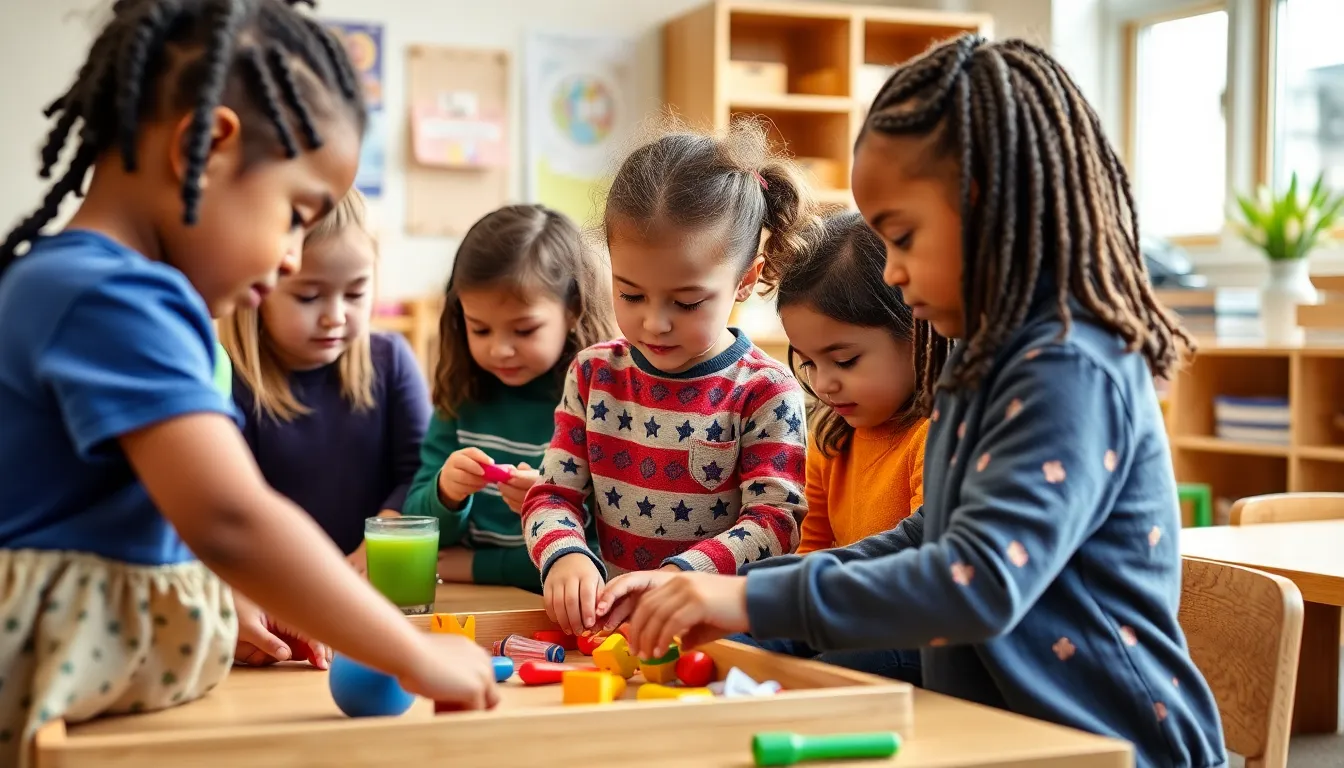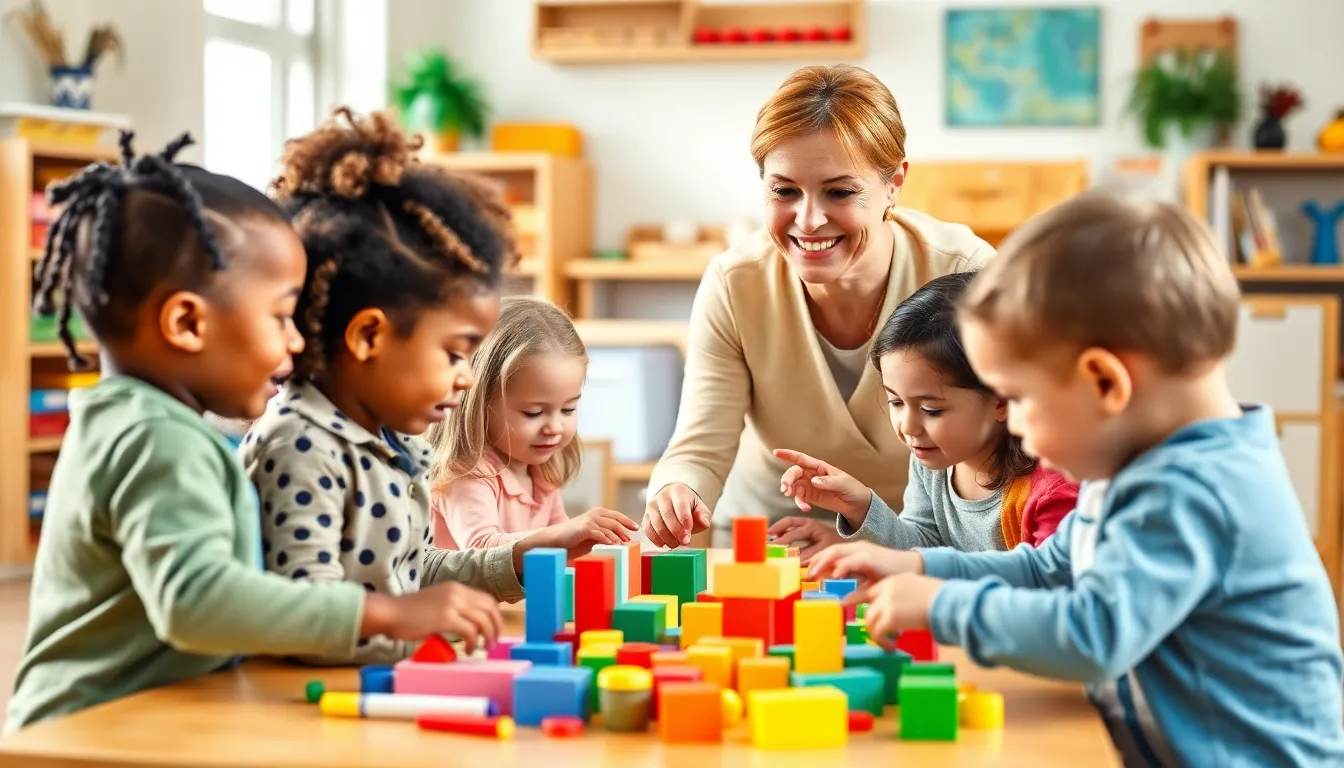Table of Contents
ToggleIn the bustling heart of Chicago, where deep-dish pizza reigns supreme and the Windy City skyline dazzles, lies a gem of educational innovation—the Montessori Academy of Chicago. This isn’t just another school; it’s a vibrant community where curiosity and creativity collide. Here, kids aren’t just taught; they’re empowered to explore, learn, and sometimes even teach their teachers a thing or two.
Imagine a place where learning feels like an adventure and every classroom is a treasure trove of discovery. Montessori Academy embraces the philosophy that children thrive when given the freedom to choose their paths. With a sprinkle of fun and a dash of professionalism, this academy transforms traditional education into an engaging experience that prepares young minds for a future as bright as the Chicago sun.
Overview of Montessori Academy of Chicago
Montessori Academy of Chicago serves as an innovative educational institution in the city’s heart. Focused on the Montessori philosophy, this academy encourages active exploration. Students enjoy the freedom of choice, fostering a rich learning environment. Classrooms incorporate hands-on materials and activities to promote independent learning.
At this academy, children engage with their peers in cooperative learning experiences. Each child receives individualized attention, aligning lessons with their unique interests and developmental stages. Teachers act as facilitators, guiding students rather than dictating knowledge. The focus remains on nurturing curiosity and fostering critical thinking skills.
Curriculum offerings include a wide range of subjects, such as math, science, language arts, and social studies. Each subject integrates real-world experiences, enhancing engagement and relevance. The academy prioritizes not only academic development but also social and emotional growth.
Recognizing the importance of community, Montessori Academy of Chicago fosters partnerships with families. This involvement strengthens educational outcomes and creates a supportive network for students. All these elements contribute to the academy’s mission of preparing students for a successful future.
The Montessori Academy of Chicago transforms traditional education through its dynamic approach. This institution emphasizes the joy of learning and prepares children for lifelong success.
Educational Philosophy

The Montessori Academy of Chicago embodies the principles of Montessori education, focusing on proactive engagement and independent exploration. This approach enhances learning through a child-centric model, allowing students to develop at their own pace.
Montessori Method Explained
The Montessori method emphasizes self-directed learning. Children choose activities that interest them, facilitating natural curiosity. Materials used are designed to be tactile and interactive, promoting hands-on experience. Teachers guide students by providing the necessary resources and support, reinforcing exploration while encouraging collaboration among peers. This method fosters critical thinking by freeing students from rigid frameworks typically found in traditional education.
Benefits of Montessori Education
Montessori education offers multiple benefits for children. Independent learning cultivates self-discipline and confidence. Cooperation with classmates nurtures social skills and emotional intelligence. The curriculum’s integration of subjects, including math, science, and arts, addresses diverse learning styles and interests. Individualized attention allows teachers to target specific developmental needs, ensuring academic and personal growth. Furthermore, this educational philosophy promotes a love for lifelong learning, preparing students for future challenges.
Programs Offered
Montessori Academy of Chicago provides a variety of programs that cater to different developmental stages, ensuring a comprehensive educational experience. The academy’s offerings promote exploration and discovery through structured environments.
Age Groups and Class Structures
Children from ages 6 weeks to 15 years participate in distinct programs tailored to their developmental needs. Infants and toddlers engage in nurturing environments that promote sensory and motor skills. Preschool and kindergarten classrooms emphasize socialization and independence through collaborative activities. Lower elementary students (ages 6-9) focus on foundational subjects while developing critical thinking. Upper elementary students (ages 9-12) explore complex concepts and engage in projects that enhance collaboration and leadership skills. Middle school programs support students ages 12-15 with a curriculum that prepares them for high school challenges.
Curriculum Highlights
The curriculum emphasizes core subjects such as math, science, language arts, and social studies, integrated with hands-on learning experiences. Interactive materials encourage problem-solving and creativity. Real-world applications enrich lessons, making education relevant and engaging. Students participate in individual and group projects, fostering teamwork while developing unique perspectives. Cultural studies broaden their understanding of the world, enhancing global awareness. Art and music education supplement academic learning, nurturing creativity and self-expression. Overall, the curriculum reflects the academy’s commitment to holistic development and lifelong learning.
Faculty and Staff
The Montessori Academy of Chicago prides itself on a dedicated team of educators and support staff committed to nurturing the growth of each child.
Qualifications and Training
Teachers at the Montessori Academy possess relevant degrees and certifications in education, particularly in Montessori methods. Many receive specialized training in child development, further enhancing their ability to cater to diverse learning styles. Ongoing professional development opportunities ensure that faculty stay current with educational best practices. Regular workshops and seminars encourage continuous improvement in teaching techniques, aligning with the academy’s commitment to high standards in education.
Teacher-Student Ratio
Maintaining a low teacher-student ratio is essential for personalized learning experiences. The academy features small class sizes, typically around 8 to 12 students per teacher. This arrangement allows for individualized attention, fostering strong relationships and enhancing understanding. Collaborative learning environments thrive under this model, ensuring that teachers can adapt lessons to suit each child’s unique interests and developmental pace. Such ratios contribute significantly to effective teaching and meaningful interactions in the classroom.
Community and Parental Involvement
Community and parental involvement play a vital role at the Montessori Academy of Chicago. This collaborative environment fosters a strong connection between families and the school.
Parent Engagement Opportunities
Parents can engage actively through various programs and initiatives. School committees offer chances for parents to voice their opinions and contribute to decision-making. Volunteer opportunities exist to support classrooms and special events, enhancing the educational experience for students. Workshops provide insights into Montessori methods, allowing parents to better understand their children’s learning processes. Regular parent-teacher conferences create dialogue, ensuring alignment on student progress and development.
Community Events and Activities
The academy organizes numerous community events and activities throughout the year. Cultural celebrations highlight the diversity within the school community, fostering inclusiveness and understanding. Family nights invite parents and children to participate in fun, educational activities together, building connections among families. Fundraising events support school programs and initiatives, creating a sense of teamwork and collaboration. By participating in these events, families strengthen their ties to the community while enriching the overall educational environment.
The Montessori Academy of Chicago stands out as a beacon of modern education. Its commitment to fostering independent learners and nurturing creativity is evident in every aspect of its curriculum. By integrating hands-on experiences with a focus on individual growth the academy prepares students not just academically but also socially and emotionally.
Parents and the community play a vital role in this enriching environment. Through active participation and collaboration the Montessori Academy creates a supportive network that enhances the learning journey for every child. With a dedicated faculty and a philosophy centered on exploration and discovery the academy cultivates a love for learning that lasts a lifetime.





